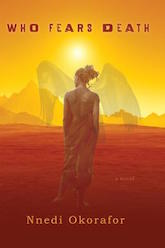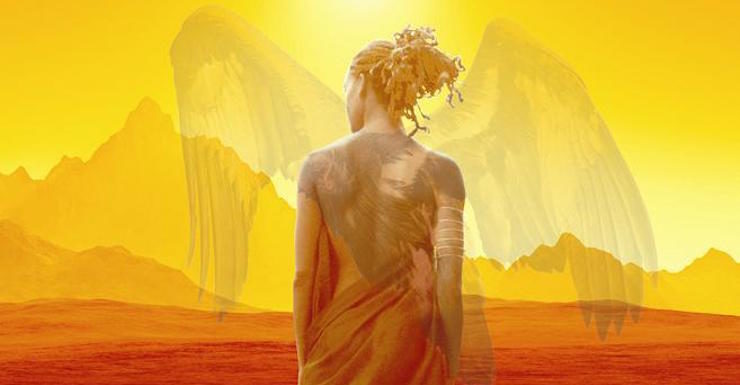In February of 2016, Fantastic Stories of the Imagination published an essay by me called “A Crash Course in the History of Black Science Fiction.” Since then Tor.com has published my in-depth essays on ten of the 42 works mentioned. The original “Crash Course” listed those 42 titles in chronological order, but the essays skip around a bit. This eleventh column is devoted to Who Fears Death, Nigerian-American author Nnedi Okorafor’s stunning novel of a post-apocalyptic Sudan.
SEEDS OF RETRIBUTION
 Okorafor’s protagonist, fiery-tempered Onyesonwu, is the daughter of genocide. Her father is Daib, a pale-skinned sorcerer who brutally rapes her dark-skinned mother, Najeeba. Daib glories openly in his crime and even films it, because he’s sure the resulting pregnancy will provide him with a son to wield as a tool against Najeeba’s people, the Okeke, who are deemed by his people, the Nuru, to be “natural slaves.” The son-to-come, Daib hopes, will help him wipe out independent Okeke villages. But Onyesonwu has a will of her own. Struggling mightily, she learns to discipline her own considerable magical powers and sets out on a murderous pilgrimage aimed at cutting off the “head of the snake”—in other words, at killing her father, general of the Nuru’s Okeke-eradicating army. Daib has unwittingly created his own destruction.
Okorafor’s protagonist, fiery-tempered Onyesonwu, is the daughter of genocide. Her father is Daib, a pale-skinned sorcerer who brutally rapes her dark-skinned mother, Najeeba. Daib glories openly in his crime and even films it, because he’s sure the resulting pregnancy will provide him with a son to wield as a tool against Najeeba’s people, the Okeke, who are deemed by his people, the Nuru, to be “natural slaves.” The son-to-come, Daib hopes, will help him wipe out independent Okeke villages. But Onyesonwu has a will of her own. Struggling mightily, she learns to discipline her own considerable magical powers and sets out on a murderous pilgrimage aimed at cutting off the “head of the snake”—in other words, at killing her father, general of the Nuru’s Okeke-eradicating army. Daib has unwittingly created his own destruction.
SF OR F? REDUX
Once again we confront the question of genre purity. Are you beginning to sense a common theme arising from these essays’ topics? Many works cited in my history of black science fiction defy classification as SF or fantasy. Who Fears Death often gets described as “science fantasy,” a hybrid term, because though indisputably taking place in a technological future, it features shapeshifters and diviners among its water distilling machines and pocket video cams. Such boundary enforcement annoys me; when I am myself asked why I included similar instances of magic in my otherwise scientifically rigorous novel Everfair, I often respond by wondering aloud why I included descriptions of weather or cooking. Those who automatically deny magic’s reality position themselves as superior in understanding to indigenous peoples’ ways of knowing the world. That’s an untenable position to take when you’re writing from the viewpoint of said indigenes.
WRITING ABOUT WEIRDNESS
Turning into a vulture, fleeing the pain of genital mutilation via transdimensional jaunts, shredding her enemies’ souls with psychic claws—Onyesonwu’s exploits consist of weirdness upon weirdness. Okorafor narrates them in the most straightforward language possible, as when she describes the sudden advent of nomads living in the center of a huge sandstorm: “The sun shone down into the giant brown funnel of sand and wind. The eye of the storm. It had to be miles wide. They came from all around us, draped from head to toe in deep red garments, as were their camels.” And whether the strangeness to be conveyed springs from magical scenarios such as this, or from caves full of ancient, broken computers, or culturally unfamiliar mundanities, Okorafor approaches it head on. She deals with oddities so matter-of-factly they’re as easy to accept as gravity.
AFROFUTURISMS R US
As I write this, the black SFFH community is in the throes of a controversy concerning the term Afrofuturism. Though coined decades ago by white academic Mark Dery in his exploration of the work of black SF author Samuel R. Delany, more recent discussions of Afrofuturism initiated by black academics such as Alondra Nelson and Reynaldo Anderson span multiple categories: music, visual art, fashion, games, and more. Okorafor is frequently mentioned in such discussions as an Afrofuturist, so her October 2017 Tweet stating that “African writers from within Africa should be the majority” of any list of examples packs a big punch. It’s a troubling pronouncement, which seems to ignore years of scholarship and creativity that focus on Afrofuturism as an artistic expression of Africa’s diaspora. It also seems to shove not just Okorafor herself but many of her colleagues off the Afrofuturist stage: Nalo Hopkinson. Tobias Buckell. Octavia E. Butler, for cryin in your homebrew.
Yet Okorafor has brought up an important point: the growing amount of increasingly accessible (thanks to the Internet) SFFH by African-native authors is a movement in need of a name. And taken as a term devoid of historic usage, “Afrofuturism” sounds like a good one. Language does change; should this Afrocentric version of Afrofuturism be the word’s new definition? Or an additional definition—perhaps with optional descriptors distinguishing its different meanings?
NEWS FROM AN AGE YET TO COME
So Who Fears Death may or may not be science fiction, depending on whether and to what extent you’re okay blending subgenres. It may or may not be Afrofuturist, depending on how strictly you draw that category’s boundaries: the action takes place hundreds of years from now in Africa; the characters are African; the author, born in Cincinnati, Ohio, is the offspring of African immigrants.
Here’s what’s much more certain: Who Fears Death is going to be a television series. HBO has optioned the book, and George R.R. Martin, of Game of Thrones fame, has agreed to be the show’s executive producer. Onyesonwu and her crew will traverse the sands of Okorafor’s centuries-distant desert in high-def color, and fly as vultures over Hollywood sets representing sentient stone forts. Millions will have the chance to watch them.
WAKE OF DREAMS
But even before becoming part of the collective imagination into which television feeds its stories, Who Fears Death has proved to be a powerful influence on readers’ unconscious minds. One single mother of my acquaintance returned to dreams of Onyesonwu’s adventures for weeks after finishing it. When we overcome our dread of immersing ourselves in the subjects Okorafor deals with—starvation, rape, and torture, to name a few—and dive in, we’re rewarded with an intensity of hope all the more amazing for the sea of pain out of which it has risen. The novel’s heroine cuts through the waves of sorrow, anger, frustration, and despair threatening to swamp her soul and continues fiercely on; her determination leaves moving traces behind her, changes in the world we can see and feel. Even in our sleep.
 Nisi Shawl is a writer of science fiction and fantasy short stories and a journalist. She is the author of Everfair (Tor Books) and co-author (with Cynthia Ward) of Writing the Other: Bridging Cultural Differences for Successful Fiction. Her short stories have appeared in Asimov’s SF Magazine, Strange Horizons, and numerous other magazines and anthologies.
Nisi Shawl is a writer of science fiction and fantasy short stories and a journalist. She is the author of Everfair (Tor Books) and co-author (with Cynthia Ward) of Writing the Other: Bridging Cultural Differences for Successful Fiction. Her short stories have appeared in Asimov’s SF Magazine, Strange Horizons, and numerous other magazines and anthologies.










